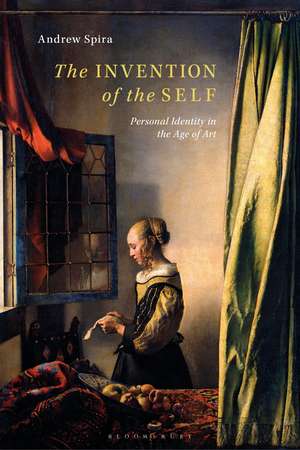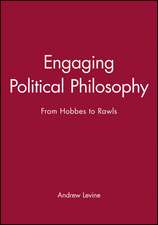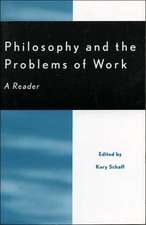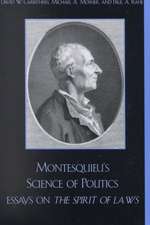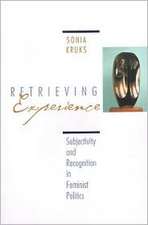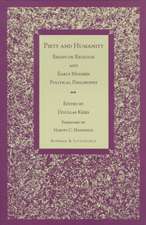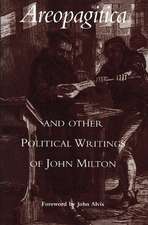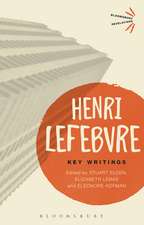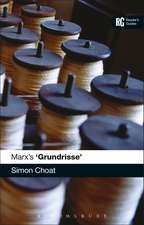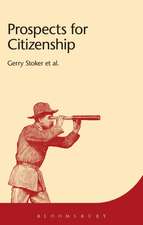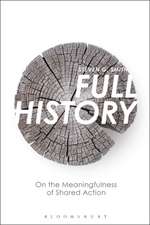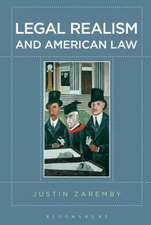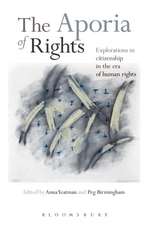The Invention of the Self: Personal Identity in the Age of Art
Autor Andrew Spiraen Limba Engleză Hardback – 22 iul 2020
| Toate formatele și edițiile | Preț | Express |
|---|---|---|
| Paperback (1) | 195.96 lei 3-5 săpt. | |
| Bloomsbury Publishing – 20 apr 2022 | 195.96 lei 3-5 săpt. | |
| Hardback (1) | 953.58 lei 6-8 săpt. | |
| Bloomsbury Publishing – 22 iul 2020 | 953.58 lei 6-8 săpt. |
Preț: 953.58 lei
Preț vechi: 1369.87 lei
-30% Nou
Puncte Express: 1430
Preț estimativ în valută:
182.47€ • 195.12$ • 152.14£
182.47€ • 195.12$ • 152.14£
Carte tipărită la comandă
Livrare economică 18 aprilie-02 mai
Preluare comenzi: 021 569.72.76
Specificații
ISBN-13: 9781350091054
ISBN-10: 1350091057
Pagini: 416
Ilustrații: 213 col illus
Dimensiuni: 156 x 234 mm
Greutate: 0.77 kg
Editura: Bloomsbury Publishing
Colecția Bloomsbury Academic
Locul publicării:London, United Kingdom
ISBN-10: 1350091057
Pagini: 416
Ilustrații: 213 col illus
Dimensiuni: 156 x 234 mm
Greutate: 0.77 kg
Editura: Bloomsbury Publishing
Colecția Bloomsbury Academic
Locul publicării:London, United Kingdom
Caracteristici
Written in a clear, non-jargony lyrical style making it accessible to academics, students and general readers alike
Notă biografică
Dr. Andrew Spira is Course Leader, Christie's Education London and a curator. He is author of Avant-Garde Icon: Russian Avant-garde Art and the Icon Painting Tradition (2008).
Cuprins
prefaceacknowledgements1. The Concept of the Self 2. The Emergence of the Self: the Structure of the Medieval Church and Popular, Heretical and Visionary Dissensions from it 3. The Resurrection of theoretical Self: Imaginative Empathy with the Suffering and Death of Christ 4. The Localisation of the Self: the Origins of Perspective and the Accommodation of the Self in Pictorial Space 5. The Necessitation of the Self: the Ennoblement of the Artist and the Invention of an Archetype 6. The Abstraction of the Self: the Secularisation of Subject-Matter and the Commodification of Art 7. The Imaginary Environments of the Self: its Physical and Intellectual Frames of Mind 8. The Privatisation of the Self: Fireplaces, Beds and Mirrors 9. The Automation of the Self: the Material Culture of Time-keeping 10. The Sensibilities of the Self: Courtesy, Conversation, Letter-writing and Novel-reading 11. The Behaviour of the Self: the Codification of Sensibility in Domestic Life 12. The Portrayal of the Self: Facial Expression and the Language of Personal Emotion 13. The Enjoyment of the Self: Sexuality and the Valorisation of Meaningless Pleasure 14. The Embodiment of the Self: the Awakening to Sensation 15. The Autonomy of the Self: the Invention of Taste and Aesthetics 16. The Naturalness of the Self: the Picturesque Transformation of Nature into a Mirror of Personal Sublimity 17. The Consummation of the Self: the Sanctification of Art 18. The Seamless Garment of the Self bibliographyindex
Recenzii
Spira has accomplished something notable: he has written a book that is learned but not exclusively so. Though he writes with a keen awareness of the discourses on private life from a variety of disciplines- philosophy, psychology, literary studies, art history-he weaves them together into one of the most accessible learned accounts of European personal identity that this reviewer has ever read. Marked by beautiful prose and scholarly acumen, this book has the ability to fundamentally transform one's appreciation of cultural history and its relationship to everyday experience.
In this radically new history of the self from the Middle Ages through the romantic period, Andrew Spira takes us on a grand tour of the evolving self-consciousness of the artist. Throughout he attends to the entire range of the material and cultural conditions that enabled particular notions of personal creativity to emerge in different historical periods. The Invention of the Self makes it clear that the very notion of the autonomous self, along with our treasured notions of personal identity, are in fact the products of a long historical process. Crossing disciplinary boundaries in stunning ways, this book will be stimulating not only to historians and historians of art but also to students of anthropology, literature, philosophy, and psychology.
'Through its innovative approach, grand scope and interdisiplinarity, this book offers a rich and exciting discourse that presents the idea of a cultural understanding of the self through the careful study of artefacts. This is a truly fascinating topic approached in a novel way.'
In The Invention of the Self, Andrew Spira traces the evolution of the self and personal identity, which he sees as having physical, psychological, and social dimensions. His account is beautifully written and extremely erudite. Throughout it, Spira's sensitivity, attention to detail, and understanding of psychological nuance are outstanding. This book deserves to be widely read.
'This is a magnificent, provocative, and daring book, depicting the changing developments of the sense of Self and its functions, over several millennia. Spira presents a continuous flow of new arguments in which the sense of Self is seen adapting to the ever-changing circumstances of each century. It is an astonishing achievement, marked by range, intelligence and wit. This is a brilliant discursive collection of essays never tangled. Its arguments, discourse and its sentences remain clear and elegant at every point.'
In this radically new history of the self from the Middle Ages through the romantic period, Andrew Spira takes us on a grand tour of the evolving self-consciousness of the artist. Throughout he attends to the entire range of the material and cultural conditions that enabled particular notions of personal creativity to emerge in different historical periods. The Invention of the Self makes it clear that the very notion of the autonomous self, along with our treasured notions of personal identity, are in fact the products of a long historical process. Crossing disciplinary boundaries in stunning ways, this book will be stimulating not only to historians and historians of art but also to students of anthropology, literature, philosophy, and psychology.
'Through its innovative approach, grand scope and interdisiplinarity, this book offers a rich and exciting discourse that presents the idea of a cultural understanding of the self through the careful study of artefacts. This is a truly fascinating topic approached in a novel way.'
In The Invention of the Self, Andrew Spira traces the evolution of the self and personal identity, which he sees as having physical, psychological, and social dimensions. His account is beautifully written and extremely erudite. Throughout it, Spira's sensitivity, attention to detail, and understanding of psychological nuance are outstanding. This book deserves to be widely read.
'This is a magnificent, provocative, and daring book, depicting the changing developments of the sense of Self and its functions, over several millennia. Spira presents a continuous flow of new arguments in which the sense of Self is seen adapting to the ever-changing circumstances of each century. It is an astonishing achievement, marked by range, intelligence and wit. This is a brilliant discursive collection of essays never tangled. Its arguments, discourse and its sentences remain clear and elegant at every point.'
